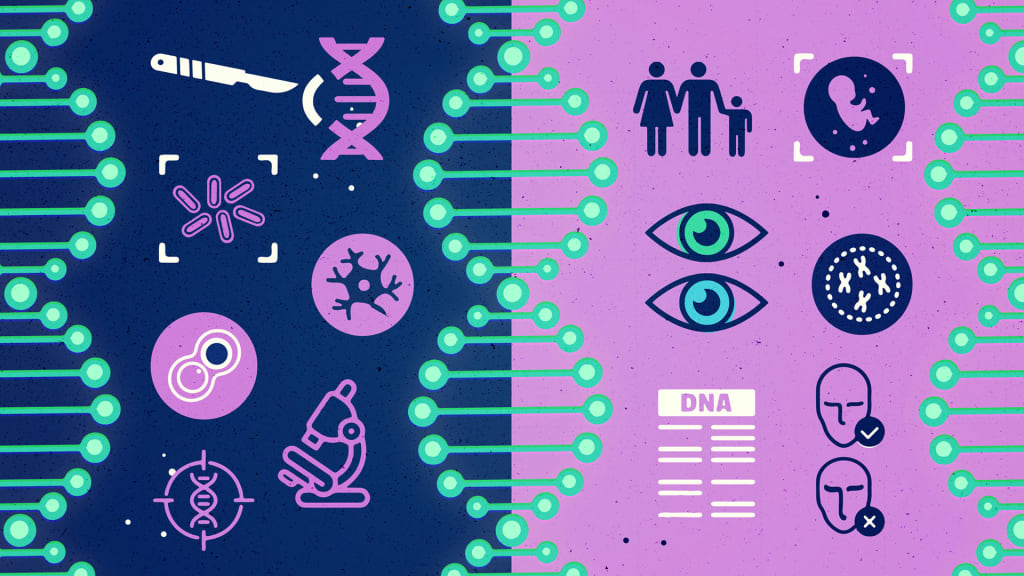The ethics of gene editing
Balancing progress with responsibility

Gene editing, or the modification of an organism’s DNA, has the potential to revolutionize the way we treat genetic diseases, create new therapies, and even enhance human traits. However, with such great power comes great responsibility. The ethical implications of gene editing are vast and complex, and we must navigate them with care to ensure that this technology is used in a way that is safe, just, and beneficial to all.
One of the most pressing concerns surrounding gene editing is the potential for unintended consequences. While the technology has made great strides in recent years, it is still far from perfect. Even small errors in the editing process could have catastrophic effects on an organism’s health or genetic makeup. For example, the CRISPR-Cas9 system, which is currently the most commonly used gene editing tool, can occasionally result in off-target mutations that could lead to cancer or other diseases. As such, it is critical that we continue to develop and improve these tools to minimize the risk of unintended consequences.
Another major ethical issue surrounding gene editing is the question of who gets to decide which genes are edited, and for what purposes. The ability to manipulate an organism’s DNA has tremendous implications for issues like disease prevention, but it could also be used for more controversial purposes, such as creating “designer babies” with enhanced physical or cognitive abilities. This raises questions about what traits are desirable, who gets to decide, and how we ensure that gene editing is used in a fair and equitable way.There also are worries approximately the ability for gene enhancing to exacerbate current social inequalities. For example, if gene editing becomes widely available, it could create a divide between those who can afford to access these technologies and those who cannot. This could lead to a world where the rich are able to enhance their physical and cognitive abilities, while the poor are left behind. As such, it is crucial that we consider the potential social implications of gene editing and work to ensure that it is accessible to all, regardless of socioeconomic status.
Furthermore, there are concerns about the long-term effects of gene editing on our environment and biodiversity. As we continue to manipulate the genetic makeup of living organisms, we run the risk of disrupting delicate ecosystems and potentially causing unintended harm to our planet’s flora and fauna. We must carefully consider the potential environmental impact of gene editing and work to mitigate any potential negative effects.
Despite these challenges, there are many potential benefits to gene editing. For example, it could be used to cure or prevent genetic diseases, create new therapies, and even help us to adapt to the challenges of a changing climate. Gene editing could also be used to enhance the well-being of non-human animals, such as by creating strains of crops that are more resilient to pests and disease.
To ensure that gene editing is used in a way that is ethical and responsible, we must establish clear guidelines and regulations for its use. This could include guidelines around who has access to gene editing technologies, what types of edits are permissible, and how we ensure that these technologies are used in a way that is safe and just. We must also continue to invest in research and development to improve the safety and efficacy of gene editing tools.
In conclusion, the ethics of gene editing are complex and multifaceted, and we must approach this technology with care and responsibility. While there are many potential benefits to gene editing, we must also consider the potential risks and work to ensure that this technology is used in a way that is safe, just, and equitable. By doing so, we can harness the power of gene editing to improve the health and well-being of people and the planet, while avoiding unintended harm.
About the Creator
Kanesarajah Panuyan
I'm Panuyan, a university student pursuing a degree in Aquatic resources technology. I'm passionate about technology and its potential to improve people's lives.
Enjoyed the story? Support the Creator.
Subscribe for free to receive all their stories in your feed. You could also pledge your support or give them a one-off tip, letting them know you appreciate their work.






Comments
There are no comments for this story
Be the first to respond and start the conversation.